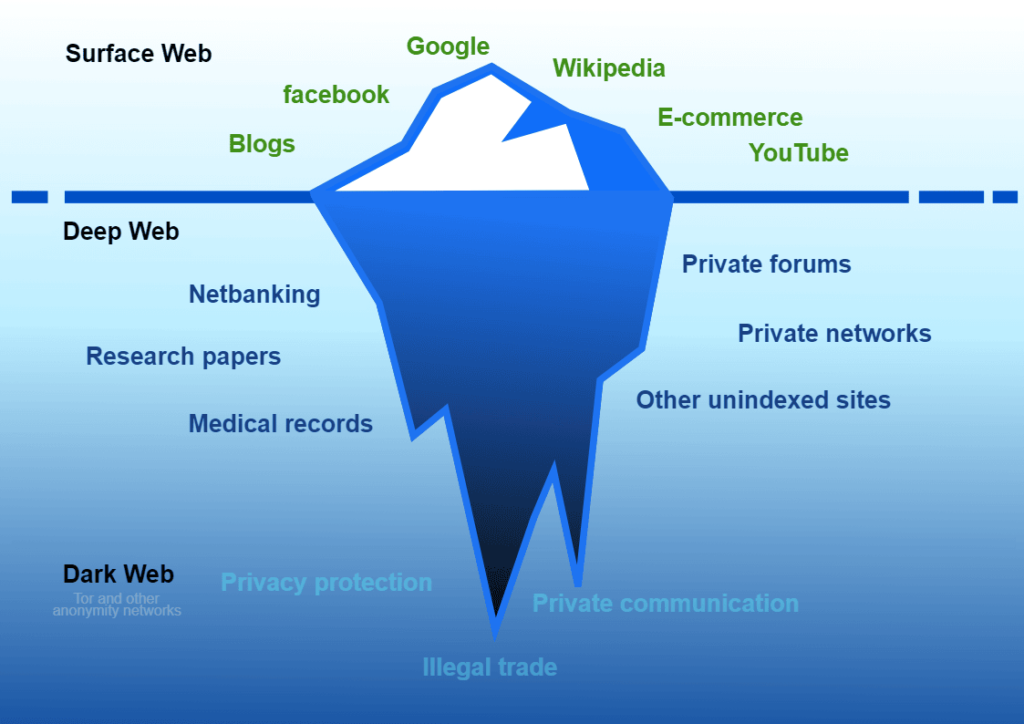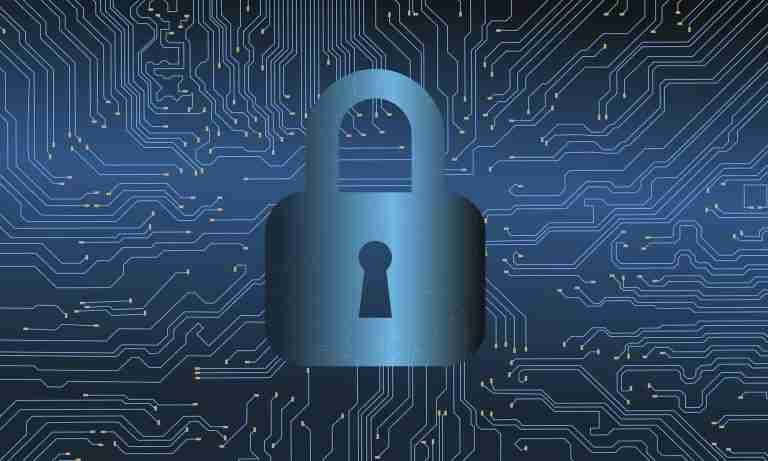The Surface Web

The surface web is the segment of the internet that is indexed by traditional search engines like Google, Bing, and Yahoo. It encompasses all accessible information that users can easily find and view without the need for specialized tools or knowledge. This part of the web is what most people interact with daily, comprising websites, blogs, and social media platforms.
Understanding the surface web is crucial for individuals and businesses seeking to leverage online resources efficiently. It provides a vast array of content, from educational blogs to news articles, available to anyone with an internet connection.
This knowledge empowers users to navigate the online landscape more effectively, ensuring they can retrieve necessary data and engage meaningfully in the digital world.
Dive on to the Deep Web
The deep web refers to parts of the internet not indexed by traditional search engines like Google or Bing. Unlike the surface web, which is accessible to anyone with an internet connection, the deep web contains a wealth of information that is hidden from general view. This includes databases, academic resources, medical records, and other data that require specific credentials for access.
One key aspect of the deep web is its vast and varied functionality. Websites hosted within this space serve many purposes – ranging from personal blogs and forums to more serious matters like government data and legal documentation.
The deep web also hosts sites that operate in anonymity, providing privacy for users who may be seeking information for sensitive topics. Many often mistakenly equate the deep web with illegal activities. While it is true that certain parts of the deep web, such as dark web forums, can be used for illicit purposes, the deep web itself houses substantive legitimate content. Understanding this division is essential for anyone looking to navigate beyond the surface web and explore what valuable resources lie beneath.
Dive further on to the Dark Web
The term “dark web” refers to a portion of the internet that is intentionally hidden and inaccessible through standard web browsers. It exists as part of a broader category known as the deep web, which encompasses all web content that is not indexed by traditional search engines such as Google or Bing. The deep web includes databases, private corporate sites, and various online services requiring authentication. In contrast, the dark web is specifically designed for anonymity and security, resulting in a unique and often misunderstood segment of online activity.
Accessing the dark web typically requires specialized software, the most common being the Tor browser. This browser utilizes onion routing to send user traffic through a network of servers, effectively masking the user’s location and enhancing privacy. This technology ensures that both users and website operators can engage in activities without revealing their identities. Such features make the dark web appealing to those seeking to maintain confidentiality for legitimate purposes. However, they also enable anonymity for illegal activities, contributing to the dark web’s reputation.
A key characteristic of the dark web is its dual nature concerning legality. While it hosts significant illegal activities, such as drug trafficking, illegal arms sales, and various other illicit services, it also serves as a refuge for individuals living under oppressive regimes. For instance, journalists, whistleblowers, and political activists often utilize this segment of the internet to communicate securely and share information without censorship or retaliation. Thus, it is crucial to differentiate between legal and illegal activities within the dark web, as the platform can have both positive and negative implications depending on the user’s intent.
Common Misconceptions
The dark web is often shrouded in mystery and misunderstanding, leading to various prevalent misconceptions. One of the most significant myths is that the dark web is exclusively a marketplace for illegal goods and services. While it is true that certain illicit activities occur in this realm, the reality is far more nuanced. The dark web comprises a vast array of websites and resources, some of which are entirely legal and serve legitimate purposes. For instance, many users access the dark web to maintain their privacy when communicating or sharing information in areas where censorship is prevalent.
Another common belief is that all activities on the dark web are dangerous or criminal in nature. This misconception fails to recognize the existence of platforms dedicated to promoting free speech, whistleblowing, and activism. Numerous journalists and human rights advocates utilize the dark web to bypass government surveillance and oppression, making it a valuable tool for societal progress in some contexts. Much like the surface web, the dark web hosts a spectrum of activities, ranging from innocuous to malicious.
Navigating Safely
Exploring the dark web can be an intriguing endeavor, but it requires a careful approach to ensure safety and privacy. First and foremost, using a Virtual Private Network (VPN) is crucial. A reliable VPN encrypts your internet connection, making it significantly more challenging for anyone to trace your online activities back to you. This added layer of security is essential when accessing sites that may harbor illicit activities or dangerous individuals.
Another critical tip is to abstain from sharing any personal information while navigating the dark web. Unlike the surface web, where a degree of personal data sharing might be safe, the dark web is fraught with risks. Cybercriminals often exploit this anonymity to engage in nefarious activities, and inadvertently sharing identifiable information can put users in jeopardy. Therefore, it is advised to create a separate identity by using pseudonyms and disposable email addresses when interacting with others in this environment.
Moreover, always be aware of potential security threats. The dark web is home to various malicious software and scams. Be cautious when clicking links and downloading files, as these actions can expose your device to viruses or other cybersecurity threats. Utilize security software that provides real-time protection against such risks, and keep it updated regularly to fend off newly emerging threats.
While exploring the dark web, it is also vital to maintain ethical behavior. Engaging with illegal content or participating in criminal activities not only violates the law but also endangers your safety and that of others. Understanding the moral implications of your online actions will navigate the dark web more responsibly. By practicing these essential tips, individuals can explore the dark web with a greater degree of safety and responsibility.
The Impact on Society
The dark web, often portrayed as a realm solely inhabited by criminals and malcontents, possesses a complex and multifaceted impact on society. Its reputation is heavily tainted by associations with illegal activities, such as drug trafficking, human trafficking, and the exchange of stolen data. These activities raise significant concerns about security, public health, and the moral implications of its existence. The anonymity provided by the dark web facilitates a marketplace for illicit goods and services, making it increasingly challenging for law enforcement to tackle these issues. This darker aspect engenders fear and trepidation among laypeople, as incidents of cybercrime and malicious actions proliferate in the digital landscape.
However, the narrative surrounding the dark web is not solely negative. The very attributes that make the dark web a haven for illicit activities also provide an essential platform for free speech, particularly in oppressive regimes. Citizens in authoritarian countries often turn to the dark web to express dissent, share information, and access resources without fear of reprisal. This function as a liberating tool underscores the necessity of understanding the dark web beyond its criminal reputation. Through the dark web, individuals can connect with like-minded people, organize movements, and disseminate information that would be suppressed in their native environments.
Despite its role as a double-edged sword, the dark web remains an integral part of the broader dialogue about privacy, security, and freedom of expression. The balancing act between the promotion of civil liberties and the containment of harmful activities presents a significant challenge for policymakers and law enforcement agencies. Engaging with the dark web requires a nuanced understanding of these competing interests to formulate policies that can leverage its protective capabilities while mitigating the risks associated with its misuse.
“A man can do what he wills, but he cannot will what he wills.”
– Arthur Schopenhauer
Ultimately, the differences between the deep web and the dark web boil down to accessibility and intent. While the deep web serves practical purposes, the dark web often raises concerns due to its anonymity and potential for illegal activities. As users of the internet, understanding these distinctions is crucial for navigating online spaces safely and responsibly. Awareness of the deep and dark web can lead to informed decisions about what information we share and where we seek knowledge. Knowledge is power, especially in the complexities of the internet.
What’s More

My Blog ( 112 )
Dependence (10) Fiction (10) Karma (9) Landmarks (10) Paramount (9) Spectrum (9) Spotlight (10) Take Off (9) Terra Shapes (9) Trepidation (9) Unique (9) Virtue (9)
Amazing Stuff (9) Beyond Known (10) Controversial (9) Digital World (10) Inequities (10) Innovative (9) Metaphysics (9) Orbiting Entities (10) Our Society (10) Outer Space (9) Value Creation (10) Yearnings (10)

My Interests ( 115 )
Site Forum
Curious to dive deeper and ready to share your thoughts on this? Join the conversation and be part of the FORUM@ericroth.org Your online discussion board providing space for engaging exchanges on specific topics and shared interests across this website.










